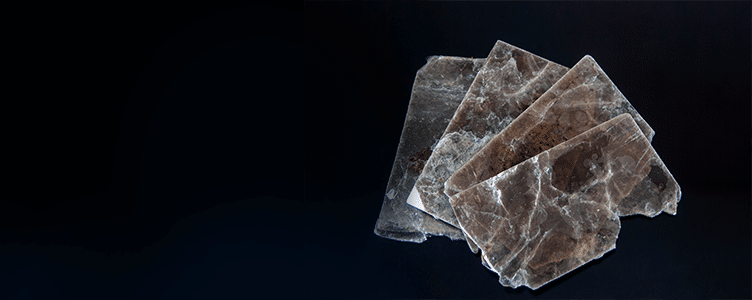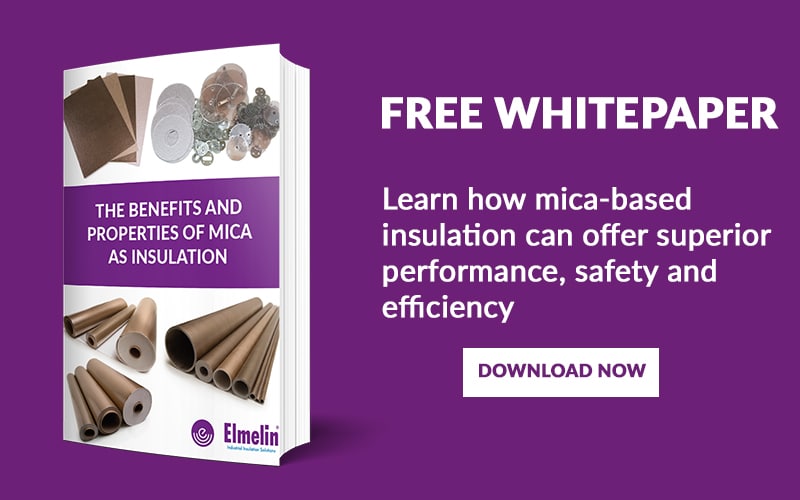
What is muscovite mica and what is it used for?
As you’re no doubt aware – insulation can be made of a whole host of other materials – fibreglass, cellulose, mineral wool. That being said, mica has very unique properties that make it an excellent choice as a basis for insulation in a range of industrial applications.
Here we’re going to look at a particular form of mica – muscovite mica – its properties and how it’s used by the industry and by Elmelin to make a variety of processes safer and more efficient.
What is muscovite mica?
Muscovite is the most common form of mica. It’s a potassium-rich mica that usually combines with aluminum and water or a hydroxyl (hydrogen bonded to oxygen) to form thin sheets. – These sheets break along very closely spaced flat planes – creating very thin sheets. It has what’s called “perfect basal cleavage”
The name “muscovite” actually originates from an early use of this form of mica. Due to its transparency, durability and insulating properties, the sheets of mica were used as windows in medieval Russia, as a cheaper alternative to glass. These were known as “muscovy windows” – which became muscovite.
Muscovite mica properties
Muscovite mica has very unique properties. Of all the types of mica products it has the highest dielectric strength in addition to a very high thermal resistance close to 900 degrees. This makes products using Muscovite fantastic dielectric and thermal insulators. As we’ve already mentioned, its atomic make-up allows it to form in very thin, transparent sheets – and it tends to be quite elastic and flexible because of this. Muscovite mica has been found to form in sheets up to 5m x 3m.
The material is also chemically inert, lightweight and resilient, making it a perfect choice to manipulate into a range of insulation solutions for industrial uses. This could be on a scale anywhere from a lining for a large industrial furnace to lining or separators in automotive batteries.
What it is used for?
In the early days, large muscovite sheets were used for oven windows, due to their capability to withstand extremely high temperatures.
Muscovite is pearlescent, which means it can add additional shine to certain paints, ceramic glazes and even cosmetics. Scrap, flaked and ground muscovite is also commonly used as fillers and extenders in products like paints, surface treatments and manufactured products.
Elmelin and many other manufacturers use muscovite mica to create industrial insulation solutions. The process starts with the muscovite being ground into a paste and made into a paper. This makes it flexible, lightweight, highly dielectric and an excellent thermal insulator.
Elmelin application of muscovite mica
We use muscovite mica to create insulative sheets, rolls, tubes and panels of all shapes and sizes. A common use of our muscovite mica solutions is insulation and protection for industrial furnaces.
As we’ve mentioned, muscovite is capable of withstanding temperatures up to 898 degrees. When combined with other materials to create a laminate, an Elmelin furnace insulation solution can withstand up to 1200 degrees, providing a slip plane which protects the inner workings of your furnace leading to less downtime and also shielding from harmful gases and fumes.
The core use of muscovite is in high voltage panels and electrical equipment. Rigid muscovite comes from stock 0.1mm sheets up to 20mm. Elmelin has the full capability to shape and cut these to size and supply on very short lead times. Our muscovite tubes are an extended electrical use of this material and is used in various applications from high voltage capacitors through to insulation on trains.
Elmelin has a full laminating department where we bond muscovite mica with materials such as silicone, bio-soluble ceramic, glass fibres or rock wool to increase its effectiveness, allow it to withstand higher temperatures and improve its durability. Our composite solutions build on the inherent insulative and flexible properties of mica to add even more benefits:
- Shock and vibration resistant
- Non-combustible
- Easy to install
- Simple to cut
- Environmentally friendly – free of organic binders
- Very precise internal and external tolerance
Recently we have been involved in multiple automotive applications around electric vehicles. Our unique ability to manufacture from first principles make us a great partner to build design, prototype and move on to series production. Our knowhow and products can support you through all phases of your project.
Due to its natural structural stability, dielectric strength, thermal capability and flexibility, mica is the perfect choice for a range of insulation applications.
If you’d like to talk to one of our experts about your insulation challenge or application, get in touch now.

